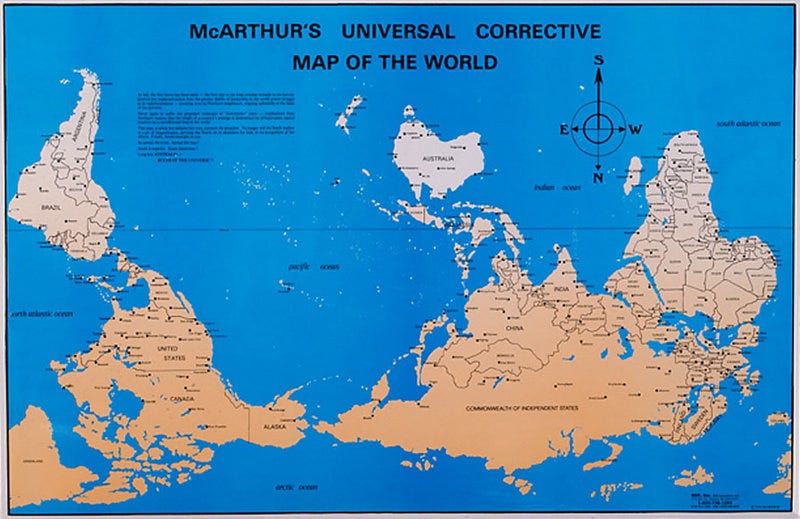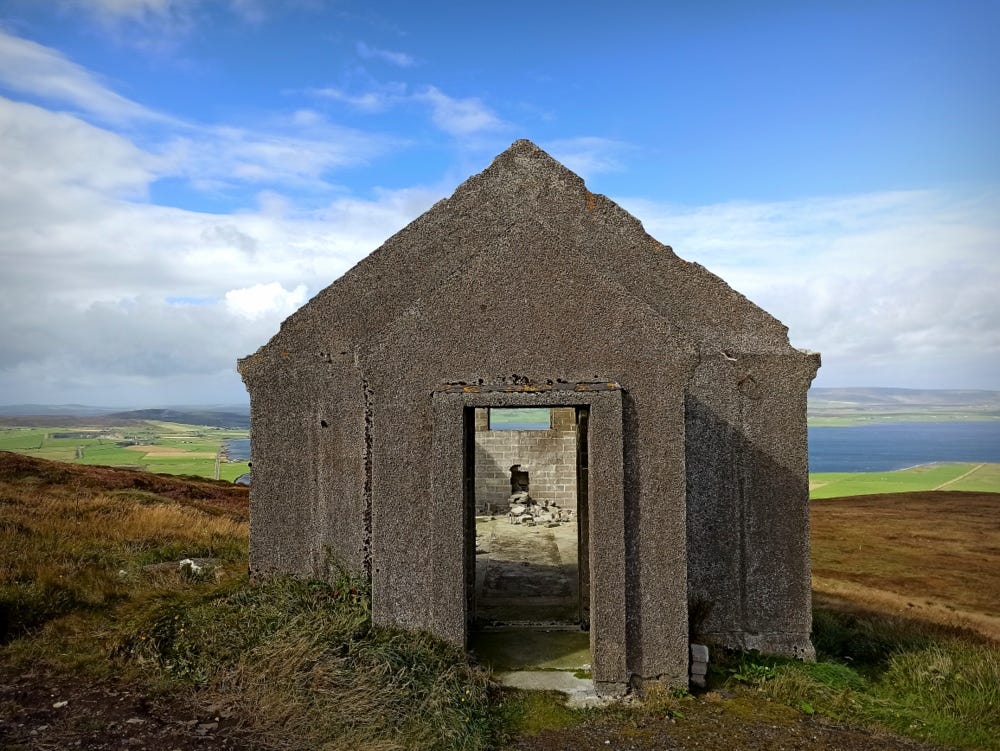Hi again!
We’ve reached the end of the second season of Everything Is Amazing.
And as with the first season, it…stretched out a few weeks further than I originally planned (for the same reason as before: the arrival of some very welcome paid work I couldn’t turn down, me being a non-rich working writer and all that).
Since the end of January, Everything Is Amazing has been a side project I’ve done entirely for free. An increasingly fun one! But definitely something I’ve had to balance with the more “job”-like side of my job...
And in the last few months, I’ve found I really don’t want to do that anymore.
No, don’t panic! I’ve only just got started with Everything Is Amazing! (Why would I want to stop having this much fun?)
But I am making some big changes, starting this week.
Scroll down to the end of this newsletter - “Time For An Announcement” - for the details.
Okay. Regarding season 2, here’s everything we covered over the last couple of months.
Nerding Out About…Unreal Geography
“Here, then, is what I’m curious about right now: the midpoint between the wholly fictional Tolkien-style maps I grew up with, and the detailed, real-world OS maps I can never seem to fold up the correct way.”
1. “Charting Nonsense-Land” - The greatest hoax in British newspaper history
According to Guardian Deputy Editor David McKie: "The impact of the seven-page survey was quite astonishing. The office all day was bedlam as people pestered the switchboard with requests for more information...[they] simply refused to believe that the islands did not exist."
2. “Is Wikipedia Reliable?” - Why everyone wants a piece of the world’s biggest encyclopedia
“Alongside the funnies (& the far-less-funnies) are the spoofs and hoaxes that were good enough to go undetected.
Compared to the 6 million articles on Wikipedia, they’re the tiniest percentage - but it’s still an alarmingly big list. The 32 that managed to escape detection for more than ten years (!) include a fictitious British slapstick TV gameshow, a fake sheik, a spurious variety of Norwegian associated football, a bogus medieval torture device, an imaginary HBO miniseries (“Sheer Perfection”), a nonexistent French actor & opera singer - and an American punk rock band that was as real as Spinal Tap.
How many others have slipped through the net?”
3. “How To Go Beyond The Map”: The imaginary South Pacific island that fooled everyone who hadn’t been there…
“The overlapping composite of all those photos is what gets uploaded to our phones - and big tech would love for us to assume it’s infallible. I mean, a satellite photo is a photo of what’s actually there. How could it lie?
Try telling that to the crew of the Australian research ship R/V Southern Surveyor, which in November 2012 sailed past the South Pacific island of Sandy Island - first recorded in 1774 by Captain James Cook - and, finding nothing but ocean over a kilometre deep, officially undiscovered it.”
4. “The Imaginary Town That Refused To Stay Fake”
“If you’re ever in Delaware County, be sure to head over to the tiny hamlet of Roscoe. There’s not really anything to see there (unless you’re into fly-fishing: Roscoe calls itself “Trout Town, USA”). But drive past the gas stations and convenience stores and head just a little north, to where an unnamed dirt road meets NY 206.
Stop the car a second, stretch your legs, and look around.
Apart from the two roads meeting and a faint shadow of a knocked-down building at the side of the road, it’s nothing but trees, grass and birdsong round here. But trust me. This is a once-in-a-lifetime experience you’re having right now.
You’re standing in Agloe, Colchester: a place which, simultaneously and without contradiction, does and doesn’t exist.”
5. “Why All Our Maps Are The Wrong Way Round”
“Reluctantly, we have to leave comfortable, reassuring deterministic reasons behind. It’s not an objective issue. It’s a relative one. North and South [are at the top & bottom of our maps] because at some point, someone decided that’s how they should be.
At last, we have arrived at the real reason our maps point in the direction they currently do.
It’s because some people really, really suck.”
6. “The Case For Imperial In A World Gone Metric” (or, ‘OK America, Maybe You’re Onto Something Here’)
“It’s easy to leap to some narrow-minded assumptions here, like I did when I first learned the United States prefers using Imperial. (For any fellow Brits feeling a similar tendency towards smugness here: let’s not forget that the U.S. was the first country in the world to adopt a decimal-based currency, all the way back in 1792, when we Brits were still faffing around with shillings, guineas, farthings and the like.)
But people aren’t stupid. Examine the growth-cycle of a tradition that’s endured for centuries, and somewhere in there you’ll usually find a sensible, logical reason it got lodged in people’s brains in the first place. And it’s often about efficiency. Nobody wants to make life harder for themselves.
So is Metric really easier to use?”
Deep Dives: The science & art of curiosity
“Mind (In) The Gap” - The curious case for thinking outside your brain
“What my friend found, I’ll argue, is that she’s smarter as a writer in [a bar at her local ski resort] than she is at home. The thoughts that were so hard to generate at her writing desk were super-easy at the back of that bar. For her. Not for other people. For people who can only think deeply in something approaching silence, a bar would be the death of creativity. (I’m sort of one of those people.)
Annie Murphy Paul’s book, which is called The Extended Mind, looks deeply at the evidence for what she calls “thinking outside the brain” and maybe what my friend would call ‘going skiing.’”
Takeaways:
When people wave their hands madly during conversation, there’s good evidence that they’re helping themselves string their words together better. (Rejoice, Italy!)
The place where you think is going to affect how you think - potentially turning travel into a performance-enhancing drug for your mind.
What if the best place to write a book is halfway up a tree?
“How To Hang Onto A Submarine” (and climb a mountain on Mars)
“The rover’s mission plan was to survive for 3 months: no small feat in a place with an average temperature of -60 Celsius, with the nearest mechanic 34 million miles away. Anything achieved beyond those 90 days was a bonus - and that’s how the scientists tackled every single day of the mission. In the words of one of the scientists, they treated each day “as if it was their last.”
All very impressive and meme-worthy. But this strategy paid off to an incredible degree. The 90-day deadline came, but Spirit kept rolling onwards.”
Takeaways:
Somewhat counterintuitively, we’re most curious about the things we already know something about…
…and perhaps this is like the ‘curious 10%’ that so effectively motivates long-distance runners (and everyone else).
At last, the answer to a question that has haunted me for years: after Indy clambers onto the U-boat in Raiders Of The Lost Ark, why didn’t the bloody thing submerge and drown him?
“The Privilege Of Curiosity”
In his book Curious, Ian Leslie documents some of the research around this:
In 1930, developmental psychologist Dorothea McCarthy studied 140 children in Minneapolis aged between 18 & 54 months, and found the ones from upper social classes asked more questions than those in lower ones.
A detailed study of 30 girls under 5 years of age by Barbara Tizard & Martin Hughes found a similar pattern: middle-class children asked more questions, but also the type of questions they asked were different. They asked more “how” and “why” questions - and strung questions together to create “passages of intellectual search,” like a series of repeated, related interrogations of Google.
Takeaways:
The ability to ask questions has a hell of a lot to do with your social group and your upbringing.
“Your ability to be curious and explore the world is directly related to your ability to feel safe and settled. So kids that don’t feel safe don’t want to see new things - they want to go back to things that are safe and familiar.”
The greatest scientific paper ever written is about writer’s block.
“Is This The Home Of Curiosity In The Brain?”
“The area in question is a strip of gray matter in the subthalamus, just under the area that works as a kind of neurological Grand Central, furiously shuttling messages back and forth from both sides of our brains.
It’s an unusually well-connected region. Parts of it thread their way to the cerebral cortex (the region where we seem to do most of our conscious thinking) and down into the spinal column. Yet until now, nobody’s had much of a clue what it’s for. Upon discovering it in 1877, Swiss neuroanatomist Auguste Forel called it “a region of which nothing certain can be said” - and named it zona incerta.”
Takeaways:
Since the zona incerta is tentatively linked to the mechanisms of “binge-like eating” and sexual arousal, perhaps describing curiosity as a lust for knowledge isn’t far off the mark?
You’d think anything called “the uncertain zone” would be a pretty good place to start doing research? No? Just me? OK. (Science is weird.)
The Protégé Effect is a fabulous way to learn new things.
“Four Amazing Ways To Live A Super-Awful Life”
“A cognitive bias is a shortcut invented by your mind, designed to make your life easier, by keeping you sane, safe and upright.
Unfortunately, it’s also an error. Your brain is messing up - sometimes with disastrous long-term consequences.”
Takeaways:
Negativity Bias makes everything feel so awful you stop asking questions…
Confirmation Bias makes everything boring, because you stop learning anything new…
Hyperbolic Discounting is a fancy way of saying “we’re all rubbish at longterm planning.”
Interview: “Jonny Miller Is Questioning Everything”
“In order to make genuine progress in the divided world we live in, we have to show up with genuine curiosity for how the other person came to this conclusion. What is their truth here? What’s underlying this opinion that they're asserting? And I think almost always, there is something new to learn there.
I've had some interesting conversations with believers: how that set of beliefs give them a sense of meaning and purpose, and help justify their beliefs that the big companies and government don't have their best interests at heart. And you can see how these beliefs are holding up their sense of identity about who they are, and giving them a sense of purpose and mission that they haven't felt previously. These truths underneath the surface of the seemingly outrageous opinions that we see. And so it is interesting to ask, How did this person get to hold this particular perspective? It’s reverse-engineering detective work.”
Ridiculous Challenges
1. Find Your Nearest Ruin, Create A To-Do Map, Look Upwards, Uncover The Story of A Treasured Thing, Discover Who Lives 100 Metres Away
2. The 7-Day Dunk, Have A “Walk It Off” Chat, Write To A Hero, Spend 24 Hours Outside, Take A Food-Holiday
Bonus!
How about saying nuts to being original?
Time For An Announcement
So, about that “I can’t do this anymore” bombshell in the intro…
Since launch, Everything Is Amazing has been completely free to read, from beginning to end. It’s been a labour of love that I’ve had to squeeze in when I wasn’t writing other, less fun stuff to pay my bills. (In this respect, I’m like most other writers. Bread needed on the table, and all that.)
I also wanted to prove the case for a newsletter about curiosity. Because yes, this topic is…a little harder to explain than most. A bit hmmm, what’s that now, I’m not sure I…what?
So I wanted to show you my idea of how it could work in practice, and what it can do for you.
I hope you’ve seen that I’m not just trying to distract you with cool things to read (since I know your Inbox is already overflowing with stuff). It’s not just wow-look-at-this articles alongside mercilessly self-deprecating accounts of my own idiocy - although, those too, obviously.
But I’m also trying to give you things you can use, because curiosity is something best put into practice, not just read about.
Except, I’m now at the point where I need investment to do that. And with that in mind, Everything Is Amazing will shortly be opening its financial doors to the public, in the form of a monthly subscription plan, alongside the existing free tier.
I’ll announce the rates in my next newsletter - think “the price of a single trip to Starbucks every month” - and I’ll show you how to subscribe to the paid version, along with what paying members are going to get every week. Free subscribers will keep getting occasional updates, but they’ll no longer get everything (including the new stuff that’s coming from Season 3 onwards).
The main impact of going paid? If I build up enough subscribers, I can stop doing other work for money (aka. those annoying interruptions), and devote myself more and more to researching, writing and shenanigizing* this project, until it’s creating the amount of good trouble I think it’s capable of achieving.
I am of course completely terrified of doing this.
I totally identify with ancient adventurers and writers who sought out wealthy patrons to fund their publications (like Muhammad al-Idrisi and King Roger II of Sicily). Wouldn’t that be brilliant? Ahh.
Except, maybe it wouldn’t be, because then that rich sponsor could pressure me to write stuff that serves them, not you. This way, I can avoid that fate. I’m not accepting paid advertising for this newsletter, or any other sort of sponsorship for it. It’s going to remain 100% independent in that respect. Nothing but your paid subscriptions. That’ll help me stay accountable to you, and serve your needs before anyone else’s.
Does that sound good? Because for me, it’s exciting.
I have big plans. Plans I honestly didn’t have six months ago, before so many of you leapt on board this thing (which frankly I’m still reeling from). The more I dig into this work, the more I think it’s important - in a slightly British, self-mocking way, but also in the way that can make life feel richer, more deliciously surprising, and filled with genuinely thrilling moments of awe and wonder.
So really, it depends on you, and if you’re willing to help me make this project bigger, better and more impactful.
Can you help me grow this thing? Are you madly on board?
I can’t wait to see your answer.
- Mike
* Not a word.











